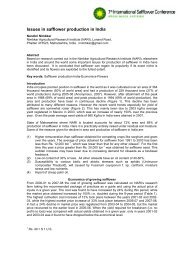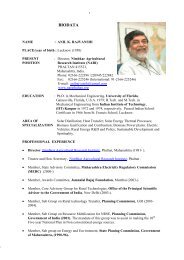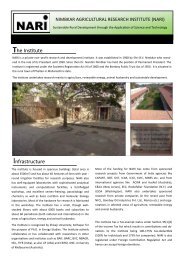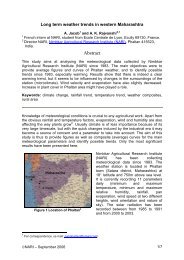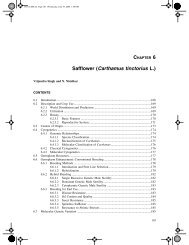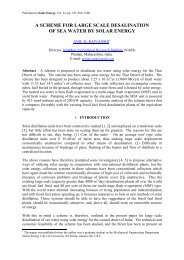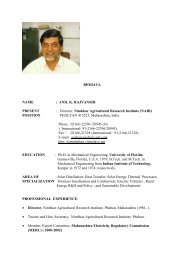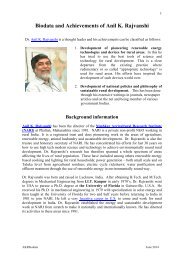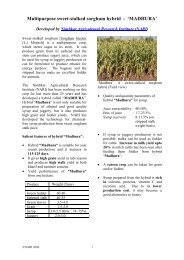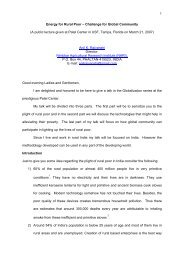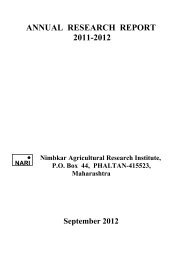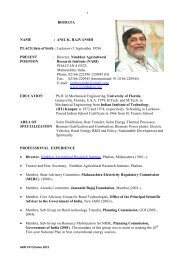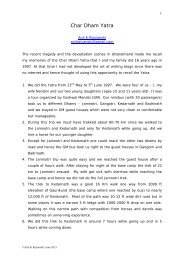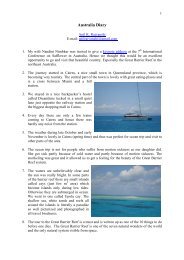The three minds of body - Brain, heart and gut - NARI
The three minds of body - Brain, heart and gut - NARI
The three minds of body - Brain, heart and gut - NARI
You also want an ePaper? Increase the reach of your titles
YUMPU automatically turns print PDFs into web optimized ePapers that Google loves.
4<br />
like electrical switches. <strong>The</strong>se nodes which are inside the <strong>heart</strong> send electrical<br />
signals to the <strong>heart</strong> muscles for contraction <strong>and</strong> are one <strong>of</strong> the most important<br />
organs <strong>of</strong> the <strong>heart</strong>. When they do not function properly the electrical signals to<br />
the muscles go haywire <strong>and</strong> the <strong>heart</strong> starts to flutter. A pacemaker attached to<br />
these nodes streamlines the signals <strong>and</strong> can restore the proper working <strong>of</strong> the<br />
<strong>heart</strong>.<br />
<strong>The</strong> speed <strong>of</strong> <strong>heart</strong>beat or its contraction changes depending upon our emotions.<br />
For example when we are aroused either by passion or anger then the <strong>heart</strong><br />
speeds up <strong>and</strong> in more quiet times or in meditation it slows down. This electrical<br />
input to the AV <strong>and</strong> SA nodes from the brain comes via the vagus nerve <strong>and</strong> is<br />
reflected in the ECG patterns <strong>of</strong> the <strong>heart</strong>.<br />
Pranayama or breathing exercises can stimulate the vagus nerve <strong>and</strong> this could<br />
have a very beneficial effect both on the <strong>heart</strong> <strong>and</strong> <strong>gut</strong>. Similarly the chanting <strong>of</strong><br />
mantras or deep throat singing as practised by Buddhist Lamas also stimulates<br />
the vagus nerve. It has been show that this stimulation helps in reducing blood<br />
pressure <strong>and</strong> improves the rhythm patterns <strong>of</strong> the <strong>heart</strong>. <strong>The</strong> neural information<br />
from both these activities facilitates the cortical function <strong>and</strong> the effect is<br />
heightened mental clarity, improved decision making <strong>and</strong> increased creativity.<br />
Similarly the stimulation <strong>of</strong> the vagus nerve helps the <strong>gut</strong> to perform better <strong>and</strong><br />
improves the cleaning process <strong>of</strong> the colon. For example the ancient Indian<br />
custom <strong>of</strong> applying pressure on cheeks by fists while sitting on toilet seat helps<br />
in the bowel movement. <strong>The</strong> pressure on cheeks stimulates the vagus nerve<br />
since its branches pass through the face. This could also be the basis <strong>of</strong><br />
children’s cheek pinching by adults!<br />
Recently scientists have also discovered that <strong>heart</strong> is involved in the processing<br />
<strong>and</strong> decoding <strong>of</strong> “intuitive information” [4]. Tests done on the subjects showed<br />
that the <strong>heart</strong> appeared to receive the intuitive information before the brain.<br />
This could be the basis <strong>of</strong> saying “Follow you <strong>heart</strong> <strong>and</strong> you will never go wrong”.<br />
© Anil K Rajvanshi, May 2011



